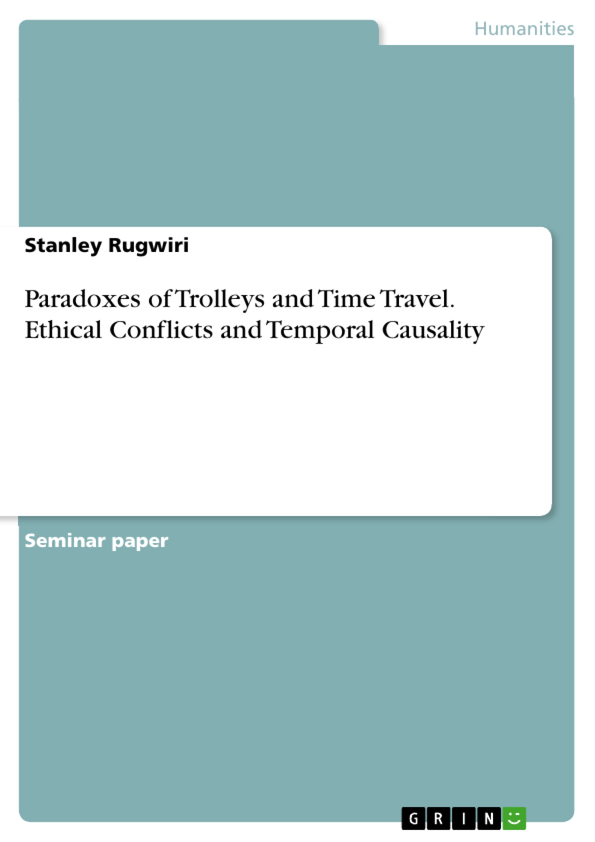This paper explores two major philosophical paradoxes: the trolley problem and the paradox of time travel. Part A analyzes the moral dilemma of choosing between killing one person or letting five die, drawing on Kant's categorical imperative and utilitarian ethics. Part B examines time travel through the lens of causal loops and reversals, where a person meets their past self, creating untraceable causal origins. Part C contrasts the practical-moral nature of the trolley problem with the metaphysical implications of time travel, highlighting key differences in logical structure and philosophical interpretation.
Table of Contents
- Part A: Thomson's Trolley Problem
- Part B: Time Travel Paradox
- Part C: Comparing Paradoxes
Objectives and Key Themes
This text analyzes two distinct paradoxes: the trolley problem and the paradox of time travel. It examines the moral dilemmas presented by the trolley problem and explores the metaphysical implications of time travel, specifically focusing on causal loops and reversals. The work aims to compare and contrast these paradoxes, highlighting their differences in approach and the philosophical frameworks used to understand them.
- Moral dilemmas and ethical decision-making
- The nature of time and causality
- Philosophical approaches to resolving paradoxes
- Comparison of practical and metaphysical paradoxes
- Exploration of causal loops and reversals in time travel
Chapter Summaries
Part A: Thomson's Trolley Problem: This section delves into the classic trolley problem, focusing on the moral complexities faced by the trolley driver. The driver confronts a situation where saving five lives necessitates sacrificing one. The analysis hinges on the conflict between utilitarianism (maximizing overall well-being by saving the five) and deontological ethics (the inherent wrongness of killing, as per Kant's categorical imperative). The author highlights the inherent paradox: either action results in a morally problematic outcome, leaving the driver in an irresolvable dilemma. The text uses this dilemma to illustrate the contradictions inherent in different moral frameworks and the constraints of rapid decision-making under pressure.
Part B: Time Travel Paradox: This part explores the paradox of time travel, specifically focusing on a scenario where an individual (referred to as S) encounters her younger self. The older S shares information about future events, creating a causal loop where the past influences the future, and vice-versa. This is examined through the lens of causal loops and causal reversals, demonstrating how time travel could potentially lead to paradoxical situations where cause and effect become intertwined and potentially untraceable. The text uses this example to demonstrate that time travel might be possible despite the seemingly impossible nature of such causal loops.
Part C: Comparing Paradoxes: This concluding section compares and contrasts the trolley problem and the time travel paradox. It categorizes the trolley problem as a practical paradox with moral implications, while classifying the time travel paradox as a metaphysical paradox, focusing on the nature of time and causality. The key distinction drawn is between the pragmatic, morally-driven approach of the trolley problem and the more theoretical, metaphysical nature of the time travel paradox. The differences in their scope and the methodologies used to analyze them are highlighted.
Keywords
Trolley problem, time travel paradox, moral dilemmas, deontological ethics, utilitarianism, causal loops, causal reversals, metaphysical paradox, practical paradox, ethical decision-making, Kant's categorical imperative.
Frequently asked questions
What is the "Paradoxes" text about?
The "Paradoxes" text is an academic analysis comparing and contrasting the trolley problem and the paradox of time travel. It examines the moral dilemmas presented by the trolley problem and the metaphysical implications of time travel, particularly causal loops and reversals. The text aims to highlight the differences in approach and the philosophical frameworks used to understand these paradoxes.
What is the trolley problem discussed in Part A?
Part A of the text delves into the classic trolley problem. It focuses on the moral dilemma where saving five lives necessitates sacrificing one. The analysis highlights the conflict between utilitarianism (saving the most lives) and deontological ethics (the wrongness of killing). It shows how both actions lead to morally problematic outcomes.
What ethical theories are applied to the Trolley Problem?
The text explicitly applies utilitarianism (maximizing overall well-being) and deontological ethics (adhering to moral duties regardless of consequences, particularly in relation to the inherent wrongness of killing) to the analysis of the trolley problem.
What is the time travel paradox explored in Part B?
Part B examines a time travel paradox involving an individual (S) encountering her younger self. The older S shares information about future events, creating a causal loop. This explores how time travel could lead to paradoxical situations where cause and effect become intertwined.
What are causal loops and causal reversals?
Causal loops and causal reversals are key concepts in the time travel paradox. A causal loop is a situation where an event is both the cause and effect of itself through time travel. Causal reversal occurs when the normal cause-and-effect relationship is disrupted.
How does Part C compare the two paradoxes?
Part C compares the trolley problem and the time travel paradox. It categorizes the trolley problem as a practical paradox with moral implications and the time travel paradox as a metaphysical paradox focusing on time and causality. It distinguishes between the pragmatic, morally-driven approach of the trolley problem and the theoretical, metaphysical nature of the time travel paradox.
What is the key difference between the trolley problem and the time travel paradox, as presented in the text?
The key difference is that the trolley problem is a practical, morally-driven dilemma, while the time travel paradox is a theoretical, metaphysical issue concerning the nature of time and causality.
What keywords are associated with this text?
Keywords include: Trolley problem, time travel paradox, moral dilemmas, deontological ethics, utilitarianism, causal loops, causal reversals, metaphysical paradox, practical paradox, ethical decision-making, Kant's categorical imperative.
- Quote paper
- Stanley Rugwiri (Author), 2023, Paradoxes of Trolleys and Time Travel. Ethical Conflicts and Temporal Causality, Munich, GRIN Verlag, https://www.grin.com/document/1593942



